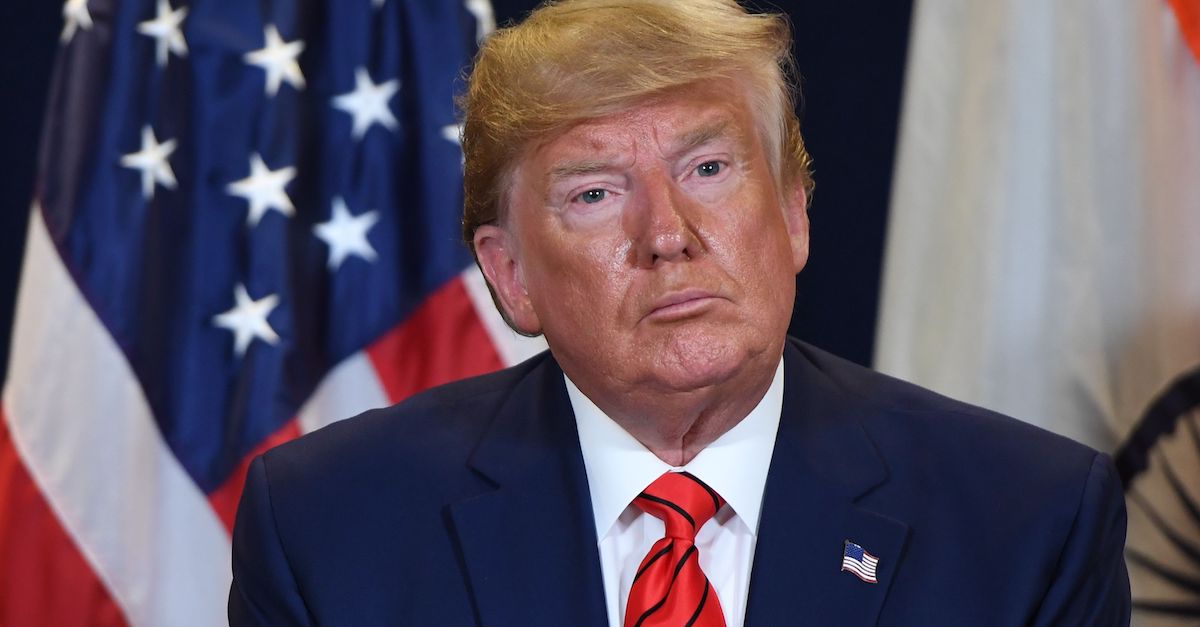
President Donald Trump saying during a press gaggle on Monday afternoon that he is attempting to find out the identity of the Ukraine phone call whistleblower is evidence of law-breaking retaliatory aims, the whistleblower’s lawyers suggested. Others were more direct on the subject.
Asked a question about the whistleblower’s identity, Trump said as follows:
We’re trying to find out about a whistleblower. We have a whistleblower that reports things that were incorrect. As you know and you probably now have figured it out, the statement I made to the president of Ukraine–a good man, nice man, new–was perfect. It was perfect. But the whistleblower reported a totally different statement, like the statement was not even made. I guess statement you could say with call, I made a call. The call was perfect. When the whistleblower reported it, he made it sound terrible.
Syntax notwithstanding, that probably wasn’t the right way for President Trump to answer the reporter’s question. Why?
Because of federal law protecting whistleblowers against retaliation. One such law, the Whistleblower Protection Act of 1989, lays down the proper procedures for aggrieved federal employees to blow the whistle on their agencies–along with provisions banning retaliation.
The law on point here is codified at 5 U.S.C. § 2302 (b)(8)-(9) and generally prohibits “a personnel action” against an employee who makes “any disclosure of information” which the employee “reasonably believes” to show “any violation of any law, rule, or regulation.” The statute also prohibits such retaliation against “the exercise of any appeal, complaint, or grievance right granted by any law, rule, or regulation” including “cooperating with or disclosing information to the Inspector General.”
Trump already said on Sunday that he wanted to “meet” both his “accuser” and the sources who gave the whistleblower their information.
The whistleblower’s lead attorney immediately sensed something amiss with Trump’s response on Monday.
“The Intel Community Whistleblower is entitled to anonymity,” Andrew P. Bakaj wrote on Twitter after Monday’s presser. “Law and policy support this and the individual is not to be retaliated against. Doing so is a violation of federal law.”
National security attorney Mark Zaid, who is also representing the whistleblower, followed up by quote-tweeting Bakaj’s remarks and adding: “NEWS UPDATE: The law is paramount, and there are no exceptions for anyone.”
Law&Crime followed up with Zaid. He said that his and Bakaj’s tweets were “official statements” from the whistleblower’s legal team on the matter. The tweets appear to suggest that President Trump is, in fact, trying to retaliate against the whistleblower by unmasking them–which, if successful, would be a violation of federal law.
Other legal experts tend to agree.
“The whistleblower’s identity is protected by law,” said CNN legal analyst and former assistant U.S. Attorney Renato Mariotti via Twitter. “Trump is trying to retaliate against a witness in plain sight.”
After the whistleblower complaint went public, Trump was also accused of witness tampering.
Zack Kopplin works with the Government Accountability Project–a hybrid transparency advocacy group, think tank-like research outfit and public interest law firm which has represented and worked with U.S. whistleblowers for over 40 years–including Edward Snowden.
Kopplin and others put a bow on Trump’s Monday comments:
You can impeach Trump for whistleblower retaliation already
— Military contractors are bribing Iraqi oligarchs (@ZackKopplin) September 30, 2019
https://twitter.com/KenGude/status/1178771301726609418?s=20
[image via SAUL LOEB/AFP/Getty Images]